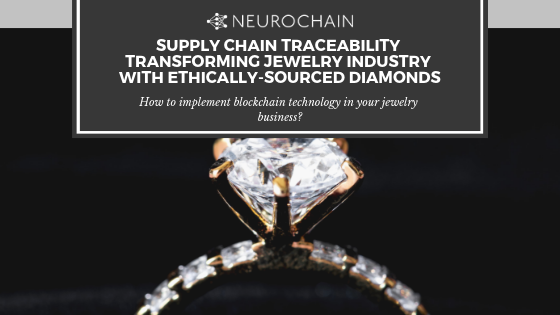TrustChain is a collaborative effort to provide better supply chain transparency surrounding the sourcing of diamonds and other precious metals. The initiative, which is powered by IBM’s blockchain technology, will “track and authenticate diamonds, precious metals, and jewelry at all stages of the global supply chain, from the mine to the retailer.” By linking together miners, refineries, and retailers, TrustChain hopes to provide customers with the ability to verify that the diamond is authentic and ethically-sourced instantly.
Proving Authenticity
Blockchain technology provides the end customer with a permanent digital record of the entire life of the diamond – from the mine to the retailer. Each time that the diamond changes hands, a new block is added to the blockchain. From the mine, the diamond is shipped to a refinery and then a polishing company before being sent to the jewelry manufacturer. After the diamond has been placed on a piece of jewelry, it is shipped to the retailer. Customers can access a verified supply chain map, increases consumer trust in the product and the brand.
Ensuring Ethical-Sourcing
Ethical-sourcing refers to the way in which the diamond was mined and who had ownership of the diamond before it was manufactured into jewelry. Ethical mining practices include providing safe working conditions, compensating workers for injuries, and paying miners an appropriate wage. Ethical ownership refers to whether or not the diamonds had been previously used to fund illegal activity. Diamonds are often used in criminal activity because they are less traceable than cash, and their value tends to remain stable. They are notoriously used in organized crime and mafias to launder money. By labeling diamonds as ethically-sourced, companies can gain a competitive advantage.
Do Consumers Really Care About Ethically-Sourced Diamonds?
Corporate Social Responsibility is the belief that businesses have a social obligation to the communities in which they operate and should promote the overall well-being of society as a whole. Supporters of Corporate Social Responsibility believe that companies who exemplify ethical practices, sustainability, and philanthropy will experience higher customer retention rates. Whether or not you have adopted the theory of Corporate Social Responsibly (CSR), the majority of consumers consider ethical-sourcing to be important when determining which product to buy.
A study published by Morgan Stanley asked consumers how important ethical-sourcing is when determining which store to shop in. Respondents rated their opinion of a scale from ‘Not at All Important’ to ‘Very Important.’ The results are as follows:
How Important is Ethical-Sourcing When Choosing Between Two Retailers

The data shows that 51% of consumers find ethical-sourcing somewhat or very important, while only 13% of consumers think that it is unimportant or not important at all. The consumers who believe that ethical-sourcing is neither important nor unimportant make up the additional 36% of the population. And this number is predicted to decrease as younger generations take a more significant interest in ethical-sourcing.

The study shows that 58% of consumers 16-24 years of age find ethics to be very or somewhat important, while only 49% of consumers 55+ are concerned with ethical-sourcing. The fact that younger generations of consumers put greater emphasis on ethically-sourced products then older generations is significant because a jeweler’s highest-paying customers are young couples getting engaged and married.
Are Consumers Willing to Pay More for Ethically-Sourced Diamonds?
Not only is there an increase in consumer demand for ethically-sourced products, but consumers are also willing to pay more for products authenticated with supply chain traceability technology. The 2015 Nielsen Global Corporate Sustainability Report, 66% of consumers are willing to pay more for sustainable products. A sustainable brand is a company that promotes a social or environmental purpose.
A separate study published in the Journal of Consumer Affairs, examined how much consumers are willing to spend on an ethically-sourced product. The results show that businesses could charge a price premium of up to 10% of the products original value. For example, if the asking price of a diamond ring is $1000, it could be sold for $1100 if its source is authenticated with blockchain technology.

Implement Blockchain Supply Chain Traceability Standards in Your Jewelry Business
The NeuroChain protocol will support supply chain traceability, allowing smart applications to be built to track and authenticate diamonds and precious metals. The NeuroChain improves upon the current problems with the current blockchain protocols; NeuroChain processes transactions quicker, consumes less energy, can interact with existing blockchain protocols and can scale between several supply chain systems.
Is blockchain right for your supply chain business? Contact us today find out more.
NeuroChain, let’s build a better world!
Photo credits: Freepik
Follow us on Telegram, Facebook, Twitter and YouTube. If you have any questions, feel free to get in touch with NeuroChain Team, and we will answer you as soon as possible!

